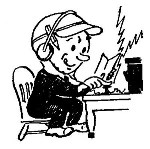“Lid” is ham-speak to denote a poor operator; one who is inept at the practice of the radio amateur art. It is someone with very poor operating technique, a newbie or an experienced ham that acts like a neophyte. This old term likely originated from the days of wired telegraphy.
A previous post entitled, What Can I Say?, presented more don’ts than dos, which was appropriate considering the topic. This is a good time to review it.
In addition to those prohibitions, we’ll expand on the topic and add a few more things a good ham doesn’t do, assuming you don’t want to be known as a lid. Most are things a good ham should avoid saying. In fact, this article was originally entitled, What Should I Not Say?
There are some bad habits certain hams need to break, mainly because it demonstrates ignorance and carelessness. Other amateurs may not take you seriously if you practice these things. Numerous ham websites list pet peeves containing these bad practices (a few are linked below).
Some liddish behavior is understandable or excusable in a brand new ham but habits form quickly. These are generally frowned upon and the perpetrator may find themselves publicly shamed (in a hammy context). Don’t let it happen to you!
Here is a short list of things a ham should not do:
- Use of CB lingo and police/public safety codes. “10-4″,”what’s your 20?”, and “breaker” are particularly egregious.
- Calling CQ or another station on an occupied frequency. This is the worst form of QRM. Hams should always ask if a frequency is in use (QRL?) first.
- Checking into a net or answering a CQ without identifying phonetically. But once you are acknowledged you should ID without phonetics.
- Partial phonetics is also bad form (e.g., KG5-alpha-bravo-charlie).
- Talking too far from or directly into the mic. See our microphone technique topic.
- Using the term “broadcasting”. Hams never, ever broadcast; they transmit. The word broadcast has a very particular meaning to the FCC.

- Using too much power or audio level (splatter) on digital modes
- Adding an S to 73. 73 by itself is fine, but pluralizing it (73s or 73’s) is the equivalent of saying “best regardses”, which doesn’t make sense.

- Calling your small VHF/UHF radio a Handie-Talkie. HT means handheld transceiver, not Handy Talkie.
This is a handheld transceiver ⇒ ![]()
This is a Handie-Talkie ⇒  See the difference?
See the difference?
- Briefly keying your mic on a repeater without ID. See our topic on Kerchunking.
- Calling CQ on a VHF/UHF repeater.

If you want to talk to somebody/anybody, simply ID and ask for a QSO.
- Over-use of Q-codes and other unique ham lingo. Makes sense in CW work but not on a local VHF net.
- Saying “over” on a repeater. The closing squelch and courtesy tone let everybody know that you are done transmitting.
All of these are bad practice; lid-like behavior, although only a few are likely to earn Continue reading






